Margo Guryan | Interview
Margo Guryan recorded a truly remarkable album, ‘Take A Picture’ in 1968. Her story doesn’t end there. In the following interview we are going to take you to the world of jazz and her prominent involvement with some of the greatest musicians of our time.
As a successful songwriter, her compositions have been recorded by the likes of Jackie DeShannon, Spanky & Our Gang, Astrid Gilberto, Claudine Longet, Oliver, Cass Elliot, Glen Campbell, Saint Etienne and Harry Belafonte.
“Think of Rain”
Where and when did you grow up? Was music a big part of your family life? Both of your parents were musicians.
Margo Guryan: I grew up in Far Rockaway, New York in the late ‘30s, ‘40s and ‘50s. It’s a small town, about 50 minutes drive from the big city. So I had the benefit of growing up in a small village but with fairly frequent visits to New York City. I was raised in my grandmother’s house. She and my grandfather raised 3 daughters in that house…all of whom went to Cornell University where my mother met my father. My grandfather died when I was a baby, so I never knew him. My grandfather was a doctor and specialized in X-Ray; he had an office in front of the house as did most doctors in that day. I went to PS 39 and Far Rockaway High School (the same schools my mother went to when she was a child).
Music was a big part of my early life. There was a Victrola and many records that entertained several generations. The records were 78 rpms and contained mostly classical music and opera recordings. I found this in an early “baby book” that was kept by my mother (I think her older sister wrote it.) The radio was turned on a great deal of the time, so I also heard the popular music of the day. This became more important to me in high-school, as it did with many of my classmates.

My mother majored in piano at Cornell, but she rarely played. She had long, polished nails which clicked away the few times I heard her…and she always laughed when she played. When my grandfather died, a young doctor took over his practice. He married my mother’s older sister. It was a big house, and for a time — during the Depression — 3 families lived there. My mother went to work at one of the two hospitals my uncle was affiliated with, trained 2 new assistants each year and started a school at the hospital for this training…which she got accredited. She remained there until she retired.
My father was very musical, but was not a professional musician. He played the piano frequently…certainly whenever guests were at the house. He taught me ‘Tea For Two’ when I was a child…I played the melody while he accompanied me. If he ever had a thought about becoming a musician, it was quickly vanquished. It was not a proper thing for a son to do in his day. But he surely loved music and was an enormous influence on me. He bought me my first record player and my first two albums…George Shearing and Barbara Caroll…so the jazz influence was there.
When did you begin playing music? What was your first instrument? Who were your major influences?
I started piano lessons when I was 6-years-old. Kathryn Cole was a teacher brought to the house to teach my aunt (my mother’s older sister). She was my teacher until I graduated from high school. Some years I was taken out of class and had to walk home for my lessons as our schedule had to suit hers. I didn’t like Miss Cole very much…I thought “Miss Cold” would have been a better name. She would “report” me to my father if she felt I hadn’t practiced enough. Then he would sit next to me when I practiced and say “do it again” if he felt that was necessary. I didn’t like these sessions! I only remember one time in all those years when she said, “Margo, that was beautiful!”. And she held recitals…which I also hated. As the youngest, I had to go first. And I had to sit with a bunch of other students who I didn’t know.
My first (and only) instrument was the piano. However, it was reported that I was “accomplished” on other instruments as well. It was total fiction! There were instruments I had to take in college as a composition major. I flunked the flute! First of all, I couldn’t get a sound out of the damn thing for 3 weeks! Secondly, all I wanted to play was ‘Swinging Shepherd Blues’…a popular tune at that time. I finally learned how to play it, but it sure didn’t impress the faculty. And some of the guys used to line up at the practice room window to watch me practicing the saxophone. They just stood there and laughed!
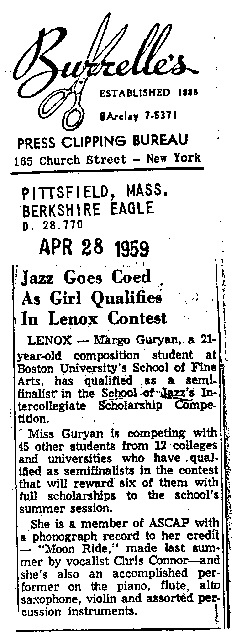
As a child I had no major influences. But as time went on I fell in love with jazz. I remember liking Ahmad Jamal a lot. I bought his records and tried (unsuccessfully) to copy his solos. I admired many jazz pianists…Bill Evans, Monk, Horace Silver, Kenny Drew, Hampton Hawes and many others…but they all had their own styles of playing and I wouldn’t (or couldn’t) copy them.
“To be a good jazz musician on any instrument, one has to be a really quick thinker”
You studied classical and jazz piano at Boston University. What do you recall from those days?
Boston University only taught classical music at that time. I auditioned and was accepted in 1959. My first teacher was Jules Wolffers, at that time the head of the piano department. I used to cherish the days I would show up for a lesson and find a note on the door which read “Lesson cancelled for today”. I didn’t like Wolffers much, nor his approach to the piano. The following semester I switched to Louis Cornell. I liked him more than Wolffers, but didn’t find him a wonderful teacher. I kept hearing other students talk about Margaret Chaloff. She was the mother of Serge Chaloff, a jazz musician…and supposedly a remarkable teacher. I sought her out and was ultimately able to have Mrs. Chaloff as my teacher.
But before I was able to make the proper switch, she was fired! Rumor had it she was fired because too many students wanted to study with her and that caused a problem for other piano professors. I asked for…and got…permission from my parents to study with her at her studio in Boston. First lesson she asked to look at my hands. “Lazy, aren’t we?”, she said. And then she asked me to play for her. “Classical, or songs I’ve written?”, I asked. Both, she said. I think that because her son was involved in jazz she had learned to appreciate creativity in any form. She accepted me as a student.
Jazz piano was another story. A few of my friends were raving about Jaki Byard, a jazz musician who had a studio and taught kids there. One day a friend took me to his studio. His wife, Louise, was the receptionist. Jaki asked me to go into his studio…alone…and play. “Classical…or songs I’ve written?”, I asked. “Everything!”, he answered. I did as directed and was accepted as a student.
To be a good jazz musician on any instrument, one has to be a really quick thinker, or internalize the chord progression. I’m a slow thinker…need time to think about where I’m going. My lessons with Jaki would make you laugh. He sat at half-a-drum-set, called a tune, I played and he banged away. “Don’t stop!” he yelled…“Keep playing!” It was useless. Neither Jaki nor Mrs. Chaloff could make a pianist out of me…I was a composer, and that was that!
While still in high school, you had an audition at Atlantic Records, where you performed songs for Jerry Wexler and Ahmet Ertegun. What can you tell us about this audition? How were you discovered at the time by Atlantic Records?
I was actually in college when George Wein (owner of the Storyville nightclub in Boston) offered me a contract to record for his Storyville label. My father felt we should seek the advice of a lawyer before signing. The lawyer we saw didn’t like the contract, but thought that if there was interest in Boston, perhaps there would be interest in New York. (I wish I remembered his name). He sent me to Frank Music (a company owned by Frank Loesser) where I met with Herb Eiseman. Herb felt my songs were to ‘jazzy’ for his company and sent me to Atlantic Records.
My parents insisted on accompanying me to the Atlantic meeting…which was embarrassing. I was called into an office where I met Jerry Wexler and Ahmet Ertegun. One of them said, “OK…let’s have your demos”. “What are demos?” I asked, having never heard the term. They rolled their eyes and said, “What did you expect to do for us?”. “I thought I was going to play songs for you”, I answered. They took me to another office with a piano in it. I played songs. First one, then when asked another…and another. After about 5 or 6 songs, one of them reached into a desk and pulled out a bunch of song contracts. They asked me to go around the corner and do exactly what I had done for Tommy Dowd who was their engineer at that time. I did that…and that’s how I found out what ‘demos’ were!
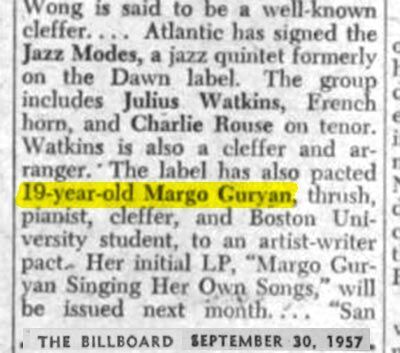
The Atlantic guys arranged a recording session which Nesuhi Ertegun was to produce. It was a total disaster! There was no tracking in those days, and each time I goofed, the musicians had to begin again. And goof I did! They told me to sing louder. The louder I sang, the worse it got. They told me not to go “off mike”…and I didn’t know what they were talking about. I have a range-break at G over middle C and my singing didn’t become acceptable until years later when it was suggested that my vocals be doubled. Nesuhi drove me home, and turned out to be a good friend. I corresponded with him when I was back at school in Boston, and he’s the one who told me about the Chris Connor recording of “Moon Ride”.
Jazz singer Chris Connor recorded your song ‘Moon Ride’ in 1958, and he also recorded ‘Lonely Woman’ with your lyrics. Was it difficult to approach and write lyrics for jazz pieces such as ‘Lonely Woman’?
Not at all. As a child I wrote “rhymes”…or what some might call poems…long before I was introduced to the piano. Since greeting cards were a no-no in my family, I was told by my parents to write a poem for all holidays…Christmas, Thanksgiving, as well as birthdays and anniversaries. When I began piano lessons it became easy to write words for the music I ‘made up’.
After I met Gunther Schuller and John Lewis in the summer of 1959, they gave me ‘Lonely Woman’ and asked if I could write words for it. The outside verses were easy, as there was a set melody and rhythm. The bridge was more difficult, because Ornette improvised…never played the bridge the same way twice. So I used the record they gave me as a guide. I took snips of melody from Ornette’s improvisation and fashioned them into a bridge. I didn’t want it to sound as though two people had written this portion of the song.
Other jazz musicians who asked me to write words for their music were John Lewis, Gary McFarland, Arif Mardin, Bob Brookmeyer and others. One of my favorites is another Ornette Coleman song. We had learned to change the title so that royalty payments wouldn’t go to one composer when two were involved. This one was originally titled ‘Una Muy Bonita’ and was changed to ‘To Welcome the Day’. The singer is Malcolm McNeill…a singer I’m very fond of.
Another early recording of your work was by Harry Belafonte, who recorded ‘I’m On My Way to Saturday’ for The Many Moods of Belafonte (1962).
This was a particularly special recording for me. I wrote it while still a teenager at the piano in my living room…daydreaming about Harry Belafonte singing it. Years later, after the Lenox School of Jazz, I was signed to MJQ Music (the company owned and run by Gunther Schuller and John Lewis). “On My Way to Saturday” was one of the songs I gave them.
Gunther and John submitted the song to Leon Bibb and he recorded it. However, he never looked at the lead sheet and his recording contained the wrong chords and totally avoided what I called “calypso stops”…short holds in the music which would be indicated in classical music by a fermata. Belafonte, obviously, did not have the music but followed Leon’s recording. I was disappointed, but very, very happy that Harry recorded it. I immediately got a check from RCA (his label) for $1,500…the most money I’d ever received for my music. I remember that I took some of the money and bought a red winter coat. And I would tell people the coat was a gift from Harry Belafonte!
Many years later, I was crossing Fifth Avenue in NYC and walking toward me was Harry Belafonte! I stopped him, said “hello”, and told him he had recorded a song I wrote. “Which one?”, he asked. We had a short, but very pleasant conversation and went on our way.
Here’s a very early demo of this song. The vocal is mixed way down, but you can get an idea of the right chord changes. Also, it’s much faster than is proper for the song.
What was the first song you ever composed?
This is impossible for me to answer! In a “lesson notebook” kept by my piano teacher, I found the back pages filled with lyrics to songs I wrote. That was years before I could write music. If I could find that lesson book, I can get the song names…and the date (from my teacher’s assignments).
If I can get this info, I’ll be happy to forward it to you.

“I was assigned to the group led by Max Roach; Ornette Coleman and Don Cherry were students”
You met and worked with Ornette Coleman and Don Cherry, and were taught by Bill Evans, Max Roach, Milt Jackson, Jim Hall, John Lewis and Gunther Schuller, among others. What are some of the strongest memories from working with above mentioned musicians?
This was at the Lenox School of Jazz which was started by Gunther Schuller and John Lewis on the property provided by Stephanie and Philip Barber in Lenox, Massachusetts. The Schaefer Brewing Company held a competition at US universities awarding scholarships to the School for the 5 winning contestants. I decided to compete and got a small group together. As only 4 groups at BU entered the competition, my group was among the winners. What a lark!! Seems it was rare for a girl to be a musician in those days and a television crew was sent to my school to photograph me with teachers and in the practice rooms. Suddenly I was on the evening news! We had to send applications to the School (Schuller and Lewis) and I was accepted.
Attending the Lenox School was one of the best experiences I’ve ever had. In 1959 I was assigned to the group led by Max Roach; Ornette Coleman and Don Cherry were students (!) and assigned to the same group. The others you mentioned were teachers. John Lewis came to take over the group; he had specific ideas about which compositions were to be played and the organization of the musicians. Max Roach remained in the group.
My relationship to Max had a rocky start. He barely answered me when I said “hello, Mr. Roach” as I passed him in the hallways. And here I was…assigned to his group! I was perfectly happy to watch and listen to the proceedings, though not asked to write anything. But a strange incident changed that:
One day, as I listened to the group rehearse, I saw Max walk from the rear of the stage to the front…where I was sitting. It occurred to me that he was going to ask me for a cigarette, so as he reached the lip of the stage, there I was holding up a pack with one cigarette pushed out. He said, “How did you know I was going to ask you for a cigarette?”. I said, “I don’t know.” Shortly after that, when the rehearsal ended, Max walked over to John Lewis and they spoke. Almost immediately, John approached me and said, “Write something for tomorrow.” I’m quite sure Max instigated this! I did write something…although who-the-hell knew what to write for Ornette Coleman at that time?…called it ‘Inn Tune’, it was played and the performance can be found on Amazon today.
I went to the Lenox School of Jazz the following year, 1960, too. That year I was assigned to Milt Jackson’s group which consisted of a vibraphonist (Gray Smith) and a trio of boys (piano, bass, drums) from Wisconsin. Unfortunately, Milt had to leave because of a death in his family. John and Gunther had no one available to lead the group, and since they knew me from the previous year they said “You’re it!” The trio hated that. Gray was fine with it, but those boys wouldn’t listen and gave me a lot of trouble. They played so badly, I finally went to John and said I didn’t think they’d be able to play in the final concert. Next day, John went to hear them. They straightened up immediately. We had rehearsed 2 tunes, one of Milt’s and one of mine. They played well when John showed up…John mumbled “They’re playing!” and left.

They did play at the concert…and played well. They later apologized to me. Funny story: After the concert, a balding, heavy-set man came up to me and told me he liked my piece. I thanked him. Shortly thereafter Gunther asked me what Artie Shaw had said to me. “Who’s Artie Shaw?,” I asked. Yep…he pointed to a heavy-set guy.
So jazz was your first love?
I might have told you this earlier, but although I was familiar with, and liked, classical and popular music, it wasn’t until I went to Boston University that I heard and fell in love with jazz. Guys were playing it in the practice rooms…and I was listening. I learned that Storyville was a club that featured some of the best jazz musicians in the world. And I learned that George Wein, who owned Storyville, was teaching a class at BU. It was an ‘elective’ class; I took it.
George had heard that I was a songwriter and we became friends. When he and his wife were out of town, George gave me the key to his apartment and let me practice on his grand piano. He allowed me to enter Storyville through a side entrance and told the wait-people to ignore me because I was under-age and couldn’t drink. Here’s a Storyville story:
One night when I was at BU, I went to Storyville to hear the Miles Davis Quintet. When I got there, the club’s manager told me the intermission pianist hadn’t shown up. He knew I was a music student and asked me if I would play. I said, “No way!” He took me upstairs to George Wein’s office, offered me a drink… and talked me into it. He told me just to play until he tapped me on the shoulder, at which time I would be finished.
Not being much of a jazz improviser, I just played my own songs (jazz-tinged at the time)… one after the other. I wasn’t a performer…didn’t smile or look at the audience…just played until I was tapped on the shoulder. I got up and began walking down an aisle when someone approached me. I couldn’t see very well because the room was dark and my eyes were still adjusting, having had a spotlight on me. This person put his hands on my shoulders and said, “Yeah, baby!” It was Miles!!
What influenced you the most to start writing differently, which ended in the Take a Picture album release?
One day in the late ‘60s a good friend, pianist/composer Dave Frishberg, called me and said he had something I must hear. I walked over to his apartment where he played me a recording of ‘God Only Knows’ by the Beach Boys. He thought it was beautiful…and so did I. Walking home, I stopped at a record store to buy the Beach Boys album. There was a long line outside the store, which I bypassed. Inside the store, a clerk asked me what I wanted. When I told him he said, “Get in line!”

When I got home I put my newly-purchased record on; I listened to all the songs but returned to ‘God Only Knows’, which I played over and over again. Then I turned off the record player, sat down at my Wurlitzer and wrote ‘Think of Rain’…the first song I wrote in that style. I began listening to the radio pop stations again and found group after group that I liked: The Mamas and Papas, Simon and Garfunkel, and ultimately Harry Nilsson (who I later met). I thought that what was happening in pop music was more innovative than what was happening in jazz. Everyone in the jazz world was trying to emulate Ornette Coleman and there was only one Ornette!

What was the writing and arranging process like?
Although my interest in the type of music had changed, the writing and arranging of music remained the same. It started with an idea…a word, a phrase, a melody. I’d simply sit down at my piano (or Wurlizter) and try to develop that idea. Sometimes it worked, sometimes it didn’t. The “arrangement” was usually part of the song as I was writing it. I didn’t write a song and then attempted to arrange it. That never worked for me, although it worked beautifully for others. George Tipton, who arranged Harry Nilsson’s ‘Without Her’ is a case in point. It was the first song written by Harry that I heard. The cello line that Tipton employed is magnificent!
Though I admire the contributions of many brilliant arrangers, my arrangements were always written into my songs.
Please share your recollections of the sessions. What were the influences and inspirations for the songs recorded? How were the songs that made it onto the LP selected?
The sessions were fun! John Simon was appointed producer by David Rosner but produced only one session…’Don’t Go Away’.
I thought this was a brilliant arrangement; true to the song, but filled with Simon’s imaginative elements…including the amazing Anahid Ajemian on violin. John Simon was offered the job of producing Janis Joplin and left our project. (Who could blame him?). I’ve wondered what ‘Take A Picture’ would sound like had he remained producer/arranger.

David Rosner, who arranged for and managed this project, then selected John Hill to produce/arrange. John was a well-schooled musician and added many of his own elements to ‘TAP’. In particular, his ideas on ‘Love’ were terrific. He directed the musicians to play in 7/4, 6/4, 5.4…then spliced them together and had the song begin when 4/4 was reached.
David also selected the songs which would appear on the LP. Sometimes I disagreed with him…as I did with the first single. He wanted it to be “Spanky and Our Gang”…a song I wrote as a “thank-you” to that group for recording ‘Sunday Morning’. I wanted it to be ‘Think of Rain’. It wound up being the “Spanky” song. But mostly I agreed with David’s choices.
Would you share your insight on the albums’ tracks?
I can do some of them, others were just in the ‘can’ and included for no particular reason.
“Sunday Mornin’”
I was in David’s office one day when he was visited by Len Maxwell, a comedian who was popular at that time and a friend of David’s. We were listening to a demo of ‘Come To Me Slowly’ which had just arrived. Len was kidding around with the lyrics to that song…saying it was a ‘dirty’ song. I thought I’d write a really dirty song with lyrics that were unmistakable. It turned out to be
‘Sunday Morning’…which has turned out to be one of my most-recorded and most-played songs! Don’t forget this was still the ‘60s (probably around ‘66, ‘67) and things didn’t loosen-up till the late ‘60s.
‘Sun’…’Love Songs’…nothing in particular relating to these songs.
‘Thoughts’
On this one, I had decided to write a song with only 2-word phrases. It turned out to be ‘Thoughts’.
‘Don’t Go Away’, ‘Take a Picture’, ‘What Can I Give You’…nothing on these.
‘Think Of Rain’
I’ve mentioned that this is the first song I wrote after being so impressed with ‘God Only Knows’. It remains one of my favorites.
‘Can You Tell’
This song definitely had a particular meaning for me, but it’s a secret…and I’ll never tell!
‘Someone I Know Love’
I wanted to write a song that used a Bach piece in the background. I chose ‘Jesu, Joy of Man’s Desiring’. I wrote a counterpoint to that tune, and then wrote words to the counterpoint. Voila!
‘Love’
I decided to write a song where the lyrics consisted of only 5 questions. It turned out to be ‘Love’.
How pleased were you with the sound of the album? What, if anything, would you like to have been different from the finished product?
I was pleased with the sound of the album. David (Rosner) and John (Hill) carefully mixed the album, and the engineers were helpful. I’m not a fan of “mixing”…usually go into the studio and play the piano while others are mixing. I’m called in at certain points to listen…and my big contributions are usually something like “I’d raise the vocal” or “the horns are too loud”.
We’d have a vote on anything new or different that was suggested. I can’t think of anything specific, but I do remember being voted down on a couple of suggestions. 2 against 1 is not fun. I really can’t think of anything specific that I would want to be different from the finished product.

Is there any unreleased material?
No.
What currently occupies your life?
I don’t connect with today’s music…I find little that’s inspiring or exciting. So I’m not writing these days. I still play the piano, but mostly the classics. I’m at the computer frequently and I read a lot. I’m currently re-reading “1984” by George Orwell; I feel we’re living it now. I follow politics, but find it a difficult pursuit these days. I subscribe to the New York Times and the Los Angeles Times.
My step-son, Jonathan Rosner, has become a good friend and I love spending time with him. And then there’s grocery shopping, cooking, cleaning…the usual household chores. Friends visit and I have a collection of teddy-bears which is fun to give to their children. I’ve got a lap-top which is great to watch films on. I do some gardening…and have many plants at home which I change once they’ve flowered. And then, things break down which requires phone calls and visits from repairmen. A very ordinary existence…

Let’s end this interview with some of your favourite albums.
I very much like ‘Cold’ by Wyatt Funderburk. And I like Dylan LeBlanc… Can’t think of any others, though Blake Collins is an up-and-comer.
Klemen Breznikar
Margo Guryan Facebook


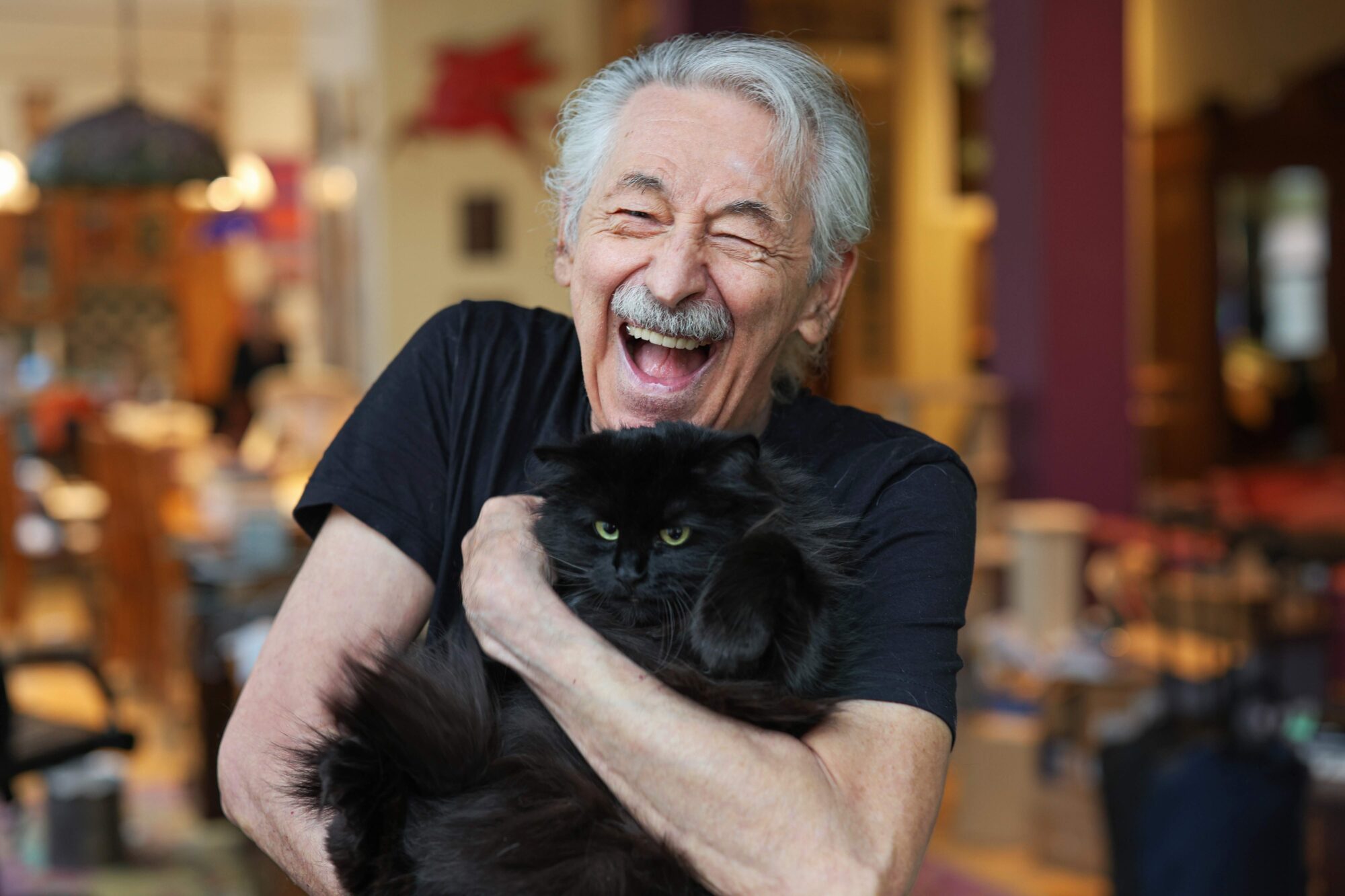
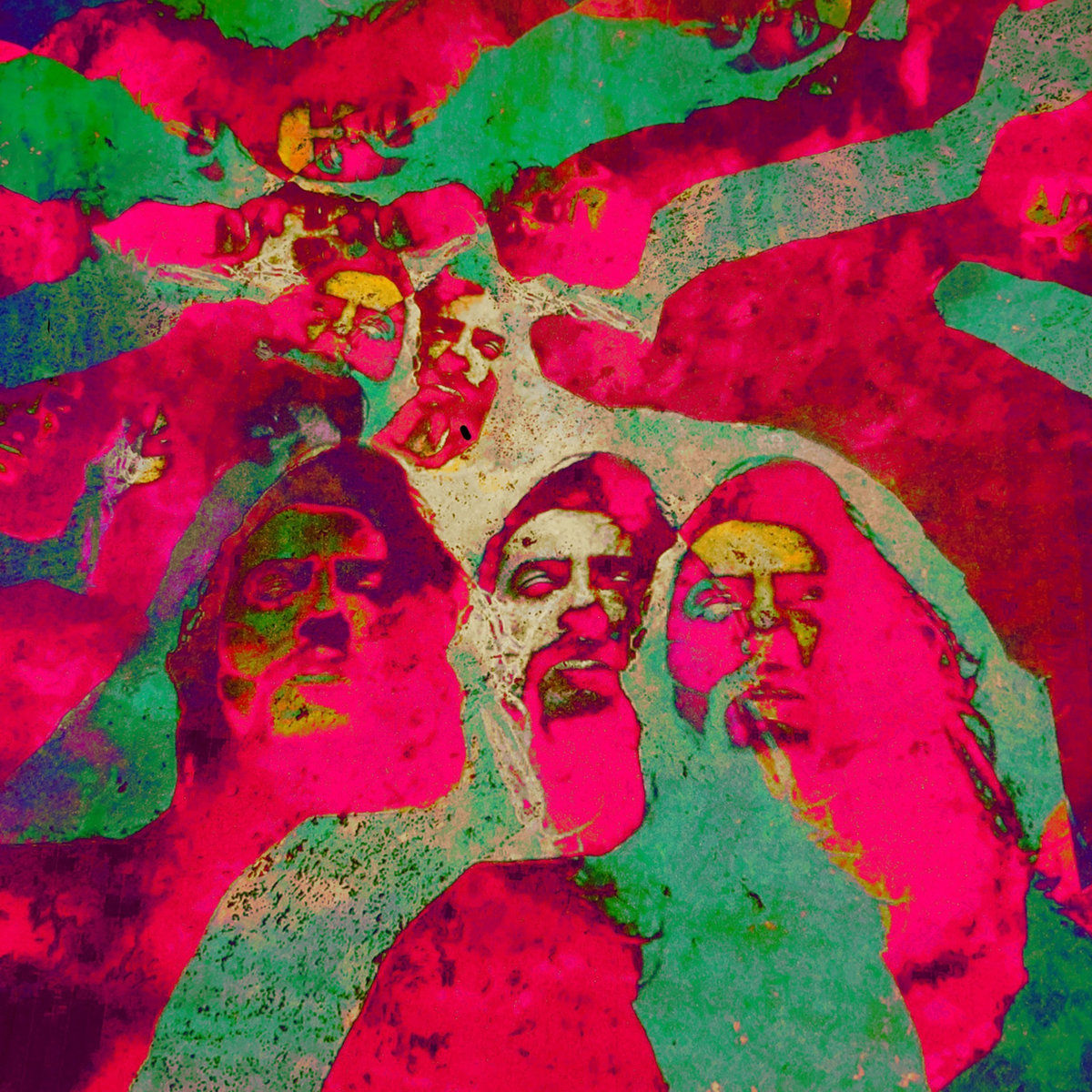
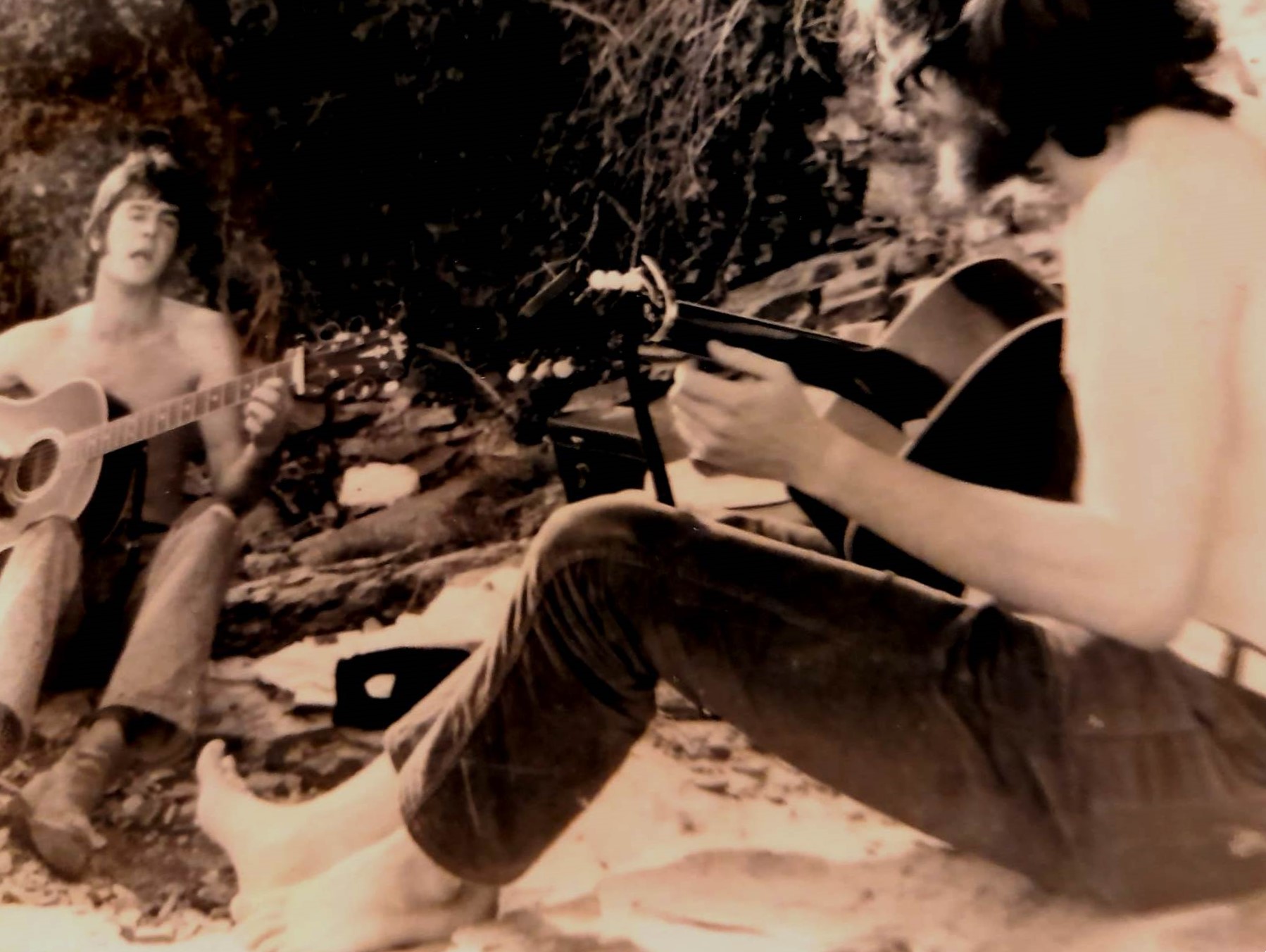
This may say more about my taste than MG's great songs:
but I dig her demos album a bit more than the official one!
But seeing the news that J Simon almost did [all] the latter,
that may have propelled it in my estimation…'elves believe in God…'.
Thanks for the interview & Margo for
those devilishly catchy choonz!
Great Interview! Thank you
i love margo <3 rip
I will love her nd her music forever ! her music is my medicine x heaven is real i lov u margo guryan(๑´ •﹏・`๑)꒰⑅꒱˖♡